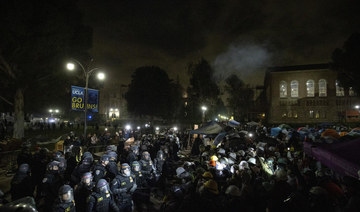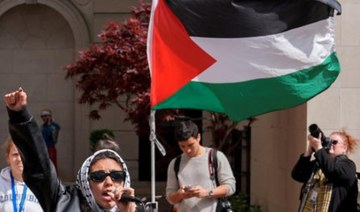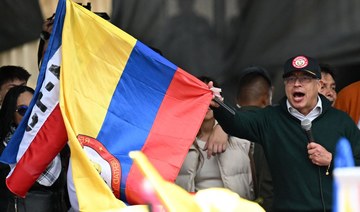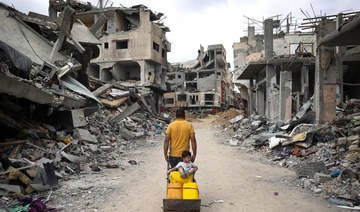BERLIN: A peaceful solution to Libya’s protracted conflict remains uncertain despite an international agreement struck in Germany, analysts say, as a fragile cease-fire between warring factions brought only a temporary truce.
On Sunday in Berlin, world leaders committed to ending all foreign meddling in Libya and to uphold a weapons embargo as part of a broader plan to end the country’s conflict.
But overnight Sunday to Monday heavy bombardment again echoed south of Tripoli — the capital of a country that has been in turmoil since the 2011 NATO-backed uprising that killed dictator Muammar Qaddafi.
Since April last year the UN-recognized Government of National Accord (GNA) based in Tripoli has fought back against an offensive launched by fighters loyal to eastern commander Khalifa Haftar.
GNA leader Fayez Al-Sarraj and Haftar attended the Berlin summit but they refused to meet and the conference failed to get the two rivals to commit to a permanent truce.
The host, German Chancellor Angela Merkel, tried hard to get Sarraj and Haftar to engage in a serious dialogue.
But after the hours-long talks, she had to put on a brave face and admit she had no illusions concerning a peaceful outcome in Libya anytime soon.
“Ensuring that a cease-fire is immediately respected is simply not easy to guarantee,” Merkel said.
Echoing Russian Foreign Minister Sergei Lavrov who took part in the talks, she said the Libyan parties had taken “a small step forward.”
Khaled Al-Montassar, a Libyan university professor of international relations, agreed that much still needs to be done.
“Theoretically, the Berlin summit was successful and touched upon all the details and the causes of the Libyan crisis,” he said.
“But the mechanisms of implementing the summit’s conclusions are still not clear.”
The summit was attended by the presidents of Russia, Turkey, France and Egypt, as well as US Secretary of State Mike Pompeo and UN chief Antonio Guterres.
The main points they agreed to will be put forward as a UN Security Council resolution.
They include a commitment to end foreign interference in Libya, respect for a UN arms embargo, a permanent cease-fire and steps to dismantle numerous militias and armed groups.
European states must now convince Italy to resume naval operations suspended since March 2019 aimed at enforcing the embargo.
Other points agreed in Berlin were a return to a political process under the auspices of the UN, respect for human rights and guarantees to ensure the security of Libya’s lucrative oil infrastructure.
The United Nations walked away from the summit satisfied at least with one key development.
The summit saw the formation of a military commission comprising five GNA loyalists and five Haftar delegates who will seek to define ways of consolidating the cease-fire.
The UN mission in Libya had for weeks urged the rival camps to submit names of delegates to such a commission, and its wish was finally answered on Sunday.
The military commission is expected to meet in the coming days, according to the UN, tasked with turning the fragile cease-fire into a permanent truce as requested by the international leaders in Berlin.
The cease-fire was co-sponsored by Russia and Turkey and has broadly held since it went into effect on January 12.
The main goal of the Berlin summit was to end the international divisions concerning Libya.
Although the GNA is recognized by the UN as Libya’s legitimate government, the world body’s member states do not agree when it comes to the oil-rich North African country.
Haftar, who insists his military campaign is aimed at battling Islamists, has the support of several countries, including Egypt, the United Arab Emirates and France, with some providing him with military and logistical backing.
The GNA is backed by Qatar and Turkey, which has recently sent some troops to shore up Sarraj’s embattled government.
Moscow is also suspected of backing Haftar but denies funding Russian mercenaries on the ground.
As a follow-up to the Berlin summit, the two rival administrations must now choose representatives to attend talks in order to revive the moribund political process, UN envoy to Libya Ghassan Salame said.
Algeria, which attended the conference and shares a border with Libya, on Monday offered to hold inter-Libyan talks on its soil. French Foreign Minister Jean-Yves Le Drian will travel to Algiers on Tuesday, his ministry said Monday, to discuss the situation in Libya, among other topics.
Future Libya talks are certain to face huge challenges, particularly after pro-Haftar forces blocked oil exports from Libya’s main ports last week.
Meanwhile, Libyans on social media remained skeptical, the deep divisions reflected in comments such as “who won, Haftar or Sarraj?“
Tripoli resident Abdul Rahman Milud said a “another summit isn’t necessary.”
Establishing “a consensus among Libyans themselves” is much more important, he told AFP.
Libya peace still elusive despite ‘small step’ in Berlin
https://arab.news/zuzt5
Libya peace still elusive despite ‘small step’ in Berlin
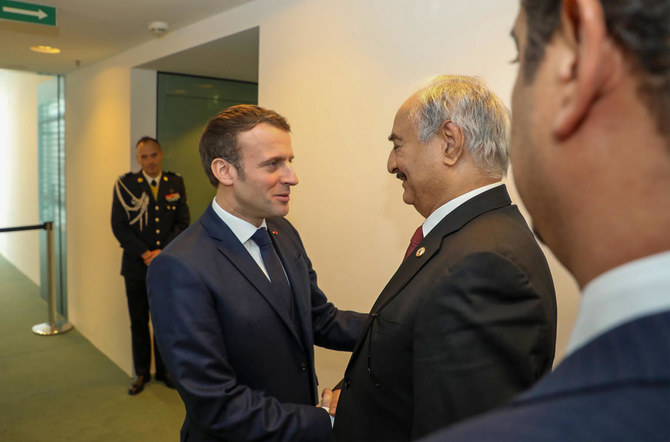
- World leaders committed to ending all foreign meddling in Libya and to upholding a weapons embargo
- GNA leader Fayez Al-Sarraj and Haftar attended the Berlin summit but they refused to meet
Houthi leader vows ‘fourth phase’ of Red Sea ship attacks
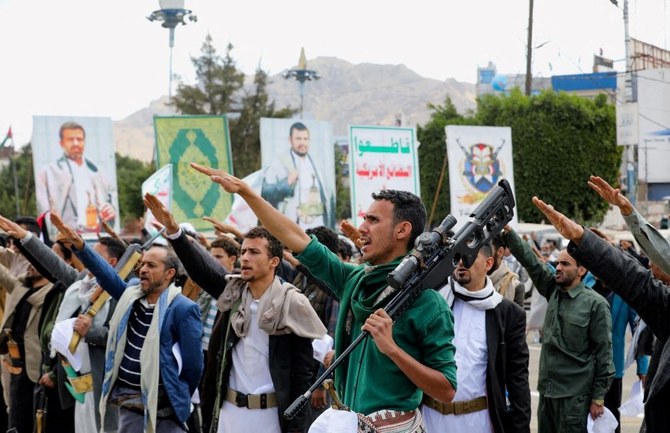
- Abdul Malik Al-Houthi: ‘We are preparing for a fourth round of escalation if the Israeli enemy and the Americans continue their intransigence’
- Al-Houthi said that 452 attacks by US and UK armies on militia-controlled regions had killed 40 people and injured 35 others since January
AL-MUKALLA: The leader of the Houthi militia vowed to escalate attacks on ships in the Red Sea until Israel ends its war in Gaza and the US stops attacking Yemen.
“We are preparing for a fourth round of escalation if the Israeli enemy and the Americans continue their intransigence,” Abdul Malik Al-Houthi said in a televised speech on Thursday.
Al-Houthi said that his forces launched 606 ballistic missiles and drones against 107 Israeli, US, and UK ships in the Red Sea, Bab Al-Mandab Strait, Gulf of Aden, and recently in the Indian Ocean during the Red Sea ship campaign that began in November.
In the last seven days alone, the Houthis have fired 33 ballistic missiles and drones at six ships in international seas off Yemen’s coast, as well as Israel’s city of Eilat.
Al-Houthi said that 452 attacks by US and UK armies on militia-controlled regions had killed 40 people and injured 35 others since January.
His warning came after the militia’s media said on Thursday that the US and UK carried out five airstrikes on Hodeidah airport in the Red Sea’s western city of Hodeidah.
On Tuesday, the US carried out another strike on the port of Al-Saleef in Hodeidah after the US Central Command reported its troops stopped a Houthi assault with a drone boat on the same day.
The Houthis have seized a commercial ship, sunk another, and launched hundreds of missiles and drones at international navy and commercial ships in the Red Sea since November, claiming to be in support of Palestinians and pressuring Israel to cease its war in Gaza.
As a response to the attacks, the US formed a coalition of marine forces to protect the Red Sea.
It also launched strikes on Houthi targets in Sanaa, Saada, Hodeidah, and other Yemeni areas controlled by the Houthis.
Turkiye’s Erdogan criticizes US crackdown on college protests
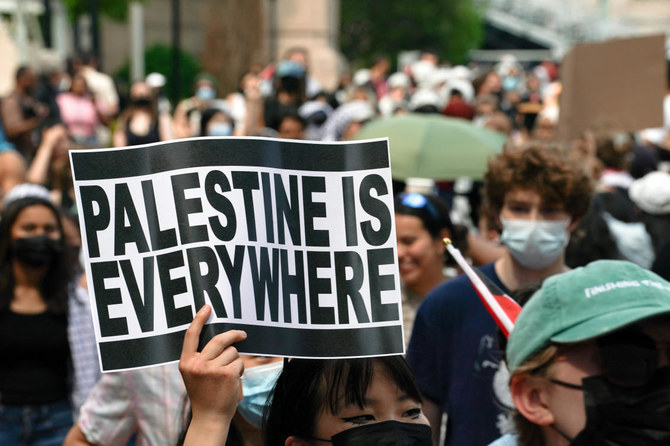
- “Conscientious students and academics including anti-Zionist Jews at some prestigious American universities are protesting the massacre (in Gaza),” Erdogan told an event
- “These people are being subjected to violence, cruelty, suffering, and even torture for saying the massacre has to stop“
ANKARA: Turkish President Tayyip Erdogan waded into the debate over US college campus protests on Thursday, saying authorities were displaying “cruelty” in clamping down on pro-Palestinian students and academics.
Demonstrations have spread on campuses across the United States over Israel’s conduct of the war in Gaza, prompting police crackdowns and arrests at some venues such as Columbia University in New York.
“Conscientious students and academics including anti-Zionist Jews at some prestigious American universities are protesting the massacre (in Gaza),” Erdogan told an event in Ankara.
“These people are being subjected to violence, cruelty, suffering, and even torture for saying the massacre has to stop,” he said, adding that university staff were being “sacked and lynched” for supporting the Palestinians.
Turkiye, a NATO ally of the United States, has sharply criticized Israel’s assault on Gaza and what it calls the unconditional support it receives from Western countries.
The US is a top supplier of military aid to Israel and has shielded the country from critical United Nations votes.
“The limits of Western democracy are drawn by Israel’s interests,” Erdogan said. “Whatever infringes on Israel’s interests is anti-democratic, antisemitic for them.”
More than 34,000 people have been killed in Gaza during Israel’s nearly seven-month military offensive, Palestinian health officials say, after Hamas militants killed some 1,200 people and took 253 hostages during an Oct. 7 assault on southern Israel, according to Israeli tallies.
Israel president says US universities ‘contaminated by hatred, anti-Semitism’

- “We see prominent academic institutions, halls of history, culture, and education contaminated by hatred and anti-Semitism fueled by arrogance and ignorance,” he said
- “We watch in horror as the atrocities of October 7th against Israel are celebrated and justified“
JERUSALEM: Israel’s president on Thursday slammed US universities for campus unrest over Israel’s war in Gaza, saying these institutions were “contaminated by hatred and anti-Semitism.”
Isaac Herzog said in a special broadcast that he was issuing an urgent message of support to Jewish communities amid a “dramatic resurgence in anti-Semitism and following the hostilities and intimidation against Jewish students on campuses across the US in particular.”
“We see prominent academic institutions, halls of history, culture, and education contaminated by hatred and anti-Semitism fueled by arrogance and ignorance,” he said.
“We watch in horror as the atrocities of October 7th against Israel are celebrated and justified.”
His comments came as hundreds of police and protesters were in a tense stand-off at the University of California, Los Angeles and unrest over Israel’s war against Hamas in Gaza continued to spread in campuses across the United States.
Demonstrators have gathered in at least 30 US universities since last month, often erecting tent encampments to protest the soaring death toll in the Gaza Strip.
Israel’s offensive in Gaza has killed at least 34,596 people in Gaza, mostly women and children, according to the Hamas-run territory’s health ministry.
It comes in response to Hamas’s unprecedented attack on Israel on October 7, which resulted in the deaths of 1,170 people, mostly civilians, according to an AFP tally of Israeli official figures.
The militants also took about 250 hostages, 129 of whom remain in Gaza, including 34 presumed dead, Israel says.
The protests against the war have posed a challenge to US university administrators trying to balance free speech rights with allegations of criminal activity, anti-Semitism and hate speech.
In his statement Thursday, Herzog said his message was addressed “to our friends on campuses and in Jewish communities across the United States and all over the world.”
“The people of Israel are with you. We hear you. We see the shameless hostility and threats. We feel the insult, the breach of faith and breach of friendship. We share the apprehension and concern,” he said.
“In the face of violence, harassment and intimidation, as masked cowards smash windows and barricade doors, as they assault the truth and manipulate history, together we stand strong,” he said.
“As they chant for intifada and genocide, we will work — together — to free our hostages held by Hamas, and fight for civil liberties and our right to believe and belong, for the right to live proudly, peacefully and securely, as Jews, as Israelis — anywhere.”
Pointing to Holocaust Memorial Day commemorations next week, the Israeli president said “we will speak of the dark times of the past, and we will remember the miracle of our rebirth.”
“Together, we shall overcome,” he said. “In the face of this terrifying resurgence of anti-Semitism: Do not fear. Stand proud. Stand strong for your freedom.”
Palestinian Embassy seeks temporary status for Gazans who entered Egypt during war
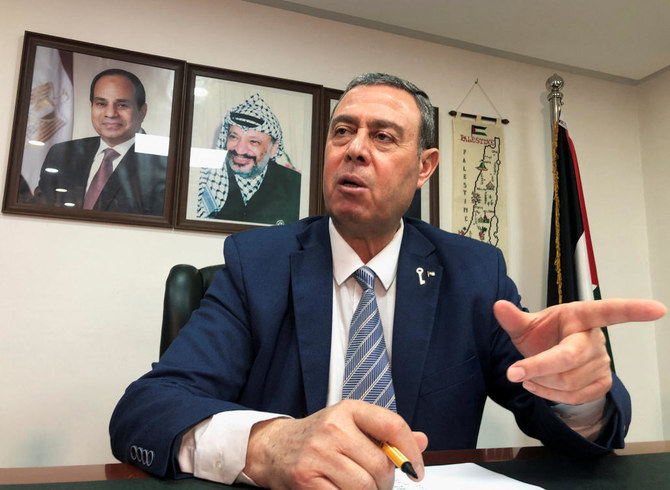
- Diab Al-Louh stressed that residency permits would only be for legal and humanitarian purposes
- Displaced Palestinians in Egypt lack papers to enrol their children in schools, open businesses or bank accounts, travel, or access health insurance
CAIRO: The Palestinian Embassy in Egypt is seeking temporary residency permits for tens of thousands of people who have arrived from Gaza during the war between Israel and Hamas, which it says would ease conditions for them until the conflict is over.
Diab Al-Louh, the Palestinian ambassador in Cairo, said as many as 100,000 Gazans had crossed into Egypt, where they lack the papers to enrol their children in schools, open businesses or bank accounts, travel, or access health insurance — though some have found ways to make a living.
Louh stressed that residency permits would only be for legal and humanitarian purposes, adding that those who arrived since the war began on Oct. 7 had no plans to settle in Egypt.
“We are talking about a category (of people) in an exceptional situation. We asked the state to give them temporary residencies that can be renewed until the crisis in Gaza is over,” Louh told Reuters in an interview.
“We have confidence that our Egyptian brothers will understand this. They have already provided a lot,” he said. “But ... this is an issue of sovereignty being discussed at the highest level.”
Egypt’s State Information Service did not immediately respond to a request for comment.
Egypt has been vocal in its opposition to any mass displacement of Palestinians from Gaza, framing this as part of wider Arab rejection of any repeat of the “Nakba,” or “catastrophe,” when some 700,000 Palestinians fled or were forced from their homes in the war surrounding Israel’s creation in 1948. Palestinian leaders also reject settlement of their people in foreign countries.
During the current war, the Rafah Crossing on the 13-km (8-mile) border between Egypt’s Sinai Peninsula and Gaza has been an entry point for aid deliveries, and has also remained largely open for passenger traffic.
But departures from Gaza, already strictly controlled before the war, have been limited to medical evacuees, foreigners and dual nationals, and Palestinians who pay fees to a company called Hala owned by a prominent Sinai businessman.
‘Things are tough’
Those leaving also need security clearance from Israel and Egypt, which together have upheld a blockade on the enclave since Hamas took power there in 2007.
“We are speaking of 100,000 who are looking forward to the day they can come back to Gaza ... maybe once a truce is reached or the war is ended,” said Louh, a Palestinian Authority official who is himself from Gaza.
“But until this happens, people need to correct their legal status.”
The embassy had already helped facilitate passage for some families to return to Gaza during the war, Louh said. Some Palestinians, including visitors and students enrolled at Egyptian universities, became stranded in Egypt when the war started.
Tens of thousands of Palestinians are thought to have settled after 1948 in Egypt, though numbers were lower than in Jordan, Lebanon and Syria, where the United Nations set up refugee camps. As rules granting Palestinians equal rights to Egyptians were rescinded from around the time of Egypt’s 1978 peace accord with Israel, Palestinians say they experienced increasing difficulties in obtaining documents.
The embassy’s efforts to help Gazans in Egypt have been complicated by a lack of funds and staff. The Palestinian Authority, which has limited autonomy in the occupied West Bank, has been hit by drop in international donor funding and Israel’s withholding of tax revenues it collects on behalf of Palestinians.
“Things are tough, dangerous, and they could become more dangerous,” Louh said, referring to the possibility of a major Israeli incursion into Rafah, where more than a million Gazans have sought shelter near the border with Egypt.
Rebuilding bombed Gaza homes may take 80 years, UN says

- If construction materials are delivered five times as fast as in the last crisis in 2021, re-construction could be done by 2040
- Palestinian data shows that around 80,000 homes have been destroyed
GENEVA: Rebuilding Gaza’s shattered homes will take at least until 2040 but could drag on for many decades, according to a UN report released on Thursday.
Nearly seven months of Israeli bombardment have caused billions of dollars in damage, leaving many of the crowded strip’s high-rise concrete buildings reduced to heaps, with a UN official referring to a “moonscape” of destruction.
Palestinian data shows that about 80,000 homes have been destroyed in a conflict triggered by Hamas fighters’ deadly attacks on southern Israel on Oct. 7. Israeli strikes have killed tens of thousands of Palestinians.
In a best-case scenario in which construction materials are delivered five times as fast as in the last Gaza crisis in 2021, rebuilding destroyed homes could be done by 2040, a building assessment said.
But the UN Development Programme assessment notes that Gaza would need “approximately 80 years to restore all the fully destroyed housing units” under a scenario assuming the pace of reconstruction follows the trend of several previous Gaza conflicts.
A separate report based on satellite images analyzed by the United Nations showed that 85.8 percent of schools in Gaza had suffered some level of damage since Oct. 7. Over 70 percent of schools will require major or full reconstruction, the UN statement added.
The UNDP assessment makes a series of projections on the war’s socioeconomic impact based on the duration of the current conflict, projecting decades of suffering.
“Unprecedented levels of human losses, capital destruction, and the steep rise in poverty in such a short period of time will precipitate a serious development crisis that jeopardizes the future of generations to come,” said UNDP Administrator Achim Steiner in a statement.
In a scenario where the war lasts nine months, poverty is set to increase from 38.8 percent of Gaza’s population at the end of 2023 to 60.7 percent, dragging a large portion of the middle class below the poverty line, the report said.







